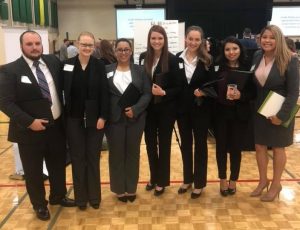Competency 1:
Demonstrate Ethical and Professional Behavior
Practice Behaviors:
- Make ethical decisions by applying the standards of the NASW Code of Ethics, relevant laws and regulations, models for ethical decision-making, ethical conduct of research, and additional codes of ethics as appropriate to context.
- Use reflection and self-regulation to manage personal values and maintain professionalism in practice situations.
- Demonstrate professional demeanor in behavior, appearance, and oral, written and electronic communication.
- Use technology ethically and appropriately to facilitate practice outcomes
- Use supervision and consultation to guide professional judgment and behavior.
Demonstrating ethical and professional behavior as a social worker means I will incorporate honesty, integrity, fairness and kindness into my work and daily life. I will work to uphold the rights of each individual and will be intentional about following the code of ethics in my professional work. In becoming an ethical social worker, it is my goal to demonstrate ethical and professional behavior through all that I do and with all client families that I come in contact with. I will be aware of and make ethical decisions based on the NASW Code of Ethics, research, and ethical decision-making. I will refrain from using technology inappropriately and I will keep a well-kept, professional appearance. I will be aware of my surroundings and use self-regulation to manage my emotions in difficult situations.
Evidence 1 (Class):
For one of my social work classes, Networking and Career Development, we were taught the importance of dressing professionally, acting in a professional manner, and being prepared and competent in different areas. We learned about how to be professional for job interviews and networking opportunities. For this class, we got the opportunity to dress professionally and go to Meet the Firms. This is where multiple organizations and businesses come and network with students from Southern. Many of these organizations and businesses are looking for interns or employers. Our class was able to professionally talk with many of the individuals that were there and gain invaluable experience.
Evidence 2 (Field):
At my field practicum placement, at DFCS in Catoosa County GA, one way that I was able to demonstrate competency 1 was by identifying different biases that I found I have. I was then able to work through these biases and still work with clients treating everyone with fairness regardless or age, gender, background, or ethnicity. I wrote about this thinking process in my weekly journal and was able to discuss it with my field instructor. We talked about ways to maintain professionalism when working with these populations that made me uncomfortable as well as steps to take to process why I was uncomfortable and strategies to work through it. To read the full journal entry click here.
Evidence 3 (Additional):
I became aware of a little girl who was in need of a wheelchair as she had outgrown her current one and insurance would not cover the cost of another chair. I began to advocate for her and talk with different people about raising money to buy her the wheelchair she deserved. This gave me an opportunity to use my professional, oral, and written skills through all my interactions with different individuals. I was given permission to use all the information in the email below that I sent to different individuals when advocating for this little girl.
Skills Used:
This competency required me to use active listening skills, ethical decision-making skills and self-reflection.
Knowledge Used:
For knowledge about the NASW Code of Ethics, Values and Standards, I relied on information I learned in my different classes such as Social Work Practice with Individuals, Integrative Seminar 1 and 2, as well as experience from my practicum agency. Professional behavior and attire was learned from personal experience as well as Networking and Career Development class. I was also able to gather valuable knowledge from my field instructor through supervision and conversations with other case workers in the agency.
Values Present:
Through this competency, I used the value of dignity and worth of a person as I learned to treat everyone with fairness and kindness. I also used the value of integrity to show commitment by showing up to practicum on time, be dressed appropriately, and doing my best while at practicum.
Cognitive Processes Used:
For this competency, I had to evaluate and analyze myself and the things around me, exhibit ethical and professional behavior, and discuss many things with my field instructor and other case managers to enhance my knowledge and understanding.
Affective Processes Used:
For this competency, I had to seek understanding, examine many situations and integrate the NASW Code of Ethics, Standards and Values into my practicum.
Theoretical Foundation:
Bias Blind Spot Theory. This theory states that even though everyone has their known biases, we do not compensate enough for them and it affects our ethical decision-making ability. I had to be honest with myself and learned that even with these biases, I need to be intentional about not letting that influence my decision making and I need to continually work towards overcoming them as to treat all people with the respect that they deserve.

